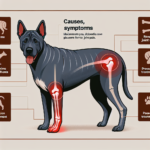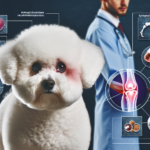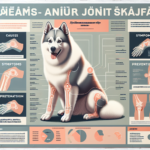Thai Ridgeback Joint Pain: Causes, Symptoms, Prevention, and Treatment

Introduction
The Thai Ridgeback is a unique and ancient breed known for its distinctive ridge of hair running along its back in the opposite direction to the rest of the coat. Originating from Thailand, this breed has a rich history as a hunting and guard dog. Thai Ridgebacks are medium to large-sized dogs, characterized by their muscular build, agility, and loyalty. They are also known for their independence and intelligence, making them both challenging and rewarding pets.
Like many breeds, Thai Ridgebacks are prone to certain health issues, with joint pain being a significant concern. Joint health is crucial for maintaining the breed’s active lifestyle and overall well-being. Understanding the causes, symptoms, prevention, and treatment of joint pain in Thai Ridgebacks can help owners ensure their pets lead healthy, pain-free lives.
Breed-Specific Joint Pain Risks
Genetic Predisposition
Thai Ridgebacks, like many purebred dogs, have a genetic predisposition to certain joint-related issues. Hip dysplasia, a condition where the hip joint doesn’t fit properly into the hip socket, is relatively common in this breed. This can lead to arthritis and significant pain over time. Elbow dysplasia, another genetic condition, affects the elbow joints and can cause similar issues. Both conditions are hereditary, meaning that responsible breeding practices are essential to reduce their prevalence.
Age-Related Risks
As Thai Ridgebacks age, the risk of developing joint pain increases. Older dogs are more susceptible to arthritis, a degenerative joint disease that causes inflammation and pain. For Thai Ridgebacks, signs of joint pain may start to appear as early as middle age, around 5-7 years old. Regular veterinary check-ups are crucial to monitor joint health as the dog ages.
Activity Level and Joint Stress
Thai Ridgebacks are known for their high energy levels and agility. They require regular exercise to stay healthy and happy. However, their active lifestyle can also contribute to joint stress, especially if they engage in high-impact activities like jumping or running on hard surfaces. Owners should be mindful of the types of activities their dogs participate in and ensure they are appropriate for their age and physical condition.
Common Symptoms of Joint Pain in Thai Ridgebacks
General Symptoms
- Limping or favoring one leg
- Stiffness, especially after resting
- Reluctance to move, jump, or climb stairs
- Decreased activity or playfulness
- Swelling around the joints
- Whining or showing signs of discomfort when touched
Breed-Specific Symptoms
In Thai Ridgebacks, joint pain may manifest more noticeably due to their typically active nature. Owners might observe a sudden decrease in their dog’s willingness to engage in physical activities they once enjoyed. Additionally, the breed’s muscular build can sometimes mask early signs of joint pain, making it essential for owners to be vigilant and proactive in monitoring their dog’s behavior and physical condition.
When to Consult a Vet
If a Thai Ridgeback shows any signs of joint pain, it’s crucial to consult a veterinarian promptly. Early intervention can prevent further deterioration and improve the dog’s quality of life. Owners should seek veterinary advice if they notice persistent limping, significant changes in activity levels, or any signs of pain or discomfort.
Preventive Measures for Joint Health
Exercise Recommendations
Regular, moderate exercise is essential for maintaining joint health in Thai Ridgebacks. Activities like walking, swimming, and controlled play can help keep their joints flexible and muscles strong without causing excessive stress. Avoid high-impact activities, especially for young puppies and older dogs, to prevent joint damage.
Dietary Suggestions
A balanced diet rich in essential nutrients can support joint health. Foods containing glucosamine, chondroitin, and omega-3 fatty acids are particularly beneficial. These nutrients help maintain cartilage health and reduce inflammation. Owners might consider supplements if their dog’s diet lacks these components, but it’s always best to consult a veterinarian before making any changes.
Weight Management
Maintaining a healthy weight is crucial for reducing joint stress. Excess weight puts additional pressure on the joints, exacerbating pain and increasing the risk of arthritis. Thai Ridgeback owners should monitor their dog’s weight and adjust their diet and exercise routine as needed to keep them within a healthy weight range.
Early Screening and Monitoring
Regular veterinary check-ups are essential for early detection of joint issues. For Thai Ridgebacks, screening for hip and elbow dysplasia should be part of routine health checks, especially if the dog is intended for breeding. Early diagnosis allows for timely intervention, which can significantly improve outcomes.
Treatment Options for Joint Pain
Non-Surgical Treatments
Non-surgical treatments for joint pain in Thai Ridgebacks include medications, physical therapy, and lifestyle adjustments. Anti-inflammatory drugs and pain relievers can help manage symptoms, while physical therapy can improve joint function and reduce pain. Lifestyle changes, such as modifying exercise routines and providing supportive bedding, can also make a significant difference.
Surgical Options
In severe cases, surgical intervention may be necessary. Common surgeries for joint pain include hip replacement, arthroscopy, and joint fusion. These procedures can provide significant relief and improve the dog’s quality of life. However, surgery is typically considered a last resort after other treatments have been exhausted.
Alternative Therapies
Alternative treatments like acupuncture, hydrotherapy, and massage can also benefit Thai Ridgebacks with joint pain. Acupuncture can help reduce pain and inflammation, while hydrotherapy provides low-impact exercise that strengthens muscles without stressing the joints. Massage therapy can improve circulation and reduce muscle tension, providing relief from pain.
Lifestyle and Management Tips
Daily Care Routine
A daily care routine for a Thai Ridgeback with joint pain might include gentle exercise, such as short walks or swimming, to keep the joints flexible. Providing a balanced diet with joint-supporting nutrients and maintaining a healthy weight are also crucial. Regular veterinary check-ups and monitoring for any changes in behavior or mobility are essential for managing joint health.
Modifying the Home Environment
Making the home environment more comfortable can significantly improve a Thai Ridgeback’s quality of life. Consider using ramps instead of stairs, providing orthopedic beds for better joint support, and ensuring that food and water bowls are at a comfortable height to reduce strain on the joints.
Long-Term Management
Long-term management of joint pain involves a combination of regular veterinary care, appropriate exercise, a balanced diet, and a supportive home environment. Owners should remain vigilant for any changes in their dog’s condition and be prepared to adjust their care routine as needed to ensure their pet remains active and happy.
FAQs About Thai Ridgebacks and Joint Pain
What are the early signs of joint pain in Thai Ridgebacks?
Early signs of joint pain include limping, stiffness, reluctance to move, and decreased activity levels. Owners should also watch for swelling around the joints and any signs of discomfort when the dog is touched.
Can joint pain in Thai Ridgebacks be prevented?
While genetic predispositions cannot be entirely prevented, maintaining a healthy weight, providing a balanced diet, and ensuring regular, moderate exercise can significantly reduce the risk of joint pain. Early screening and responsible breeding practices also play a crucial role in prevention.
Are there specific exercises that are better for Thai Ridgebacks with joint pain?
Low-impact exercises like walking and swimming are ideal for Thai Ridgebacks with joint pain. These activities help maintain joint flexibility and muscle strength without causing excessive stress on the joints.
What dietary supplements can help with joint health in Thai Ridgebacks?
Supplements containing glucosamine, chondroitin, and omega-3 fatty acids can support joint health. These nutrients help maintain cartilage health and reduce inflammation. Always consult a veterinarian before adding supplements to your dog’s diet.
When should I consider surgery for my Thai Ridgeback’s joint pain?
Surgery is typically considered a last resort after other treatments have been exhausted. If your dog is experiencing severe pain that significantly impacts their quality of life and other treatments have not provided relief, consult your veterinarian to discuss surgical options.
Conclusion
Joint pain is a significant concern for Thai Ridgebacks, but with proper care and attention, it can be managed effectively. Understanding the breed-specific risks, recognizing early symptoms, and taking preventive measures are crucial for maintaining joint health. Regular veterinary check-ups, a balanced diet, appropriate exercise, and a supportive home environment can all contribute to a pain-free, active life for your Thai Ridgeback. By staying informed and proactive, owners can ensure their beloved pets enjoy a high quality of life for years to come.




